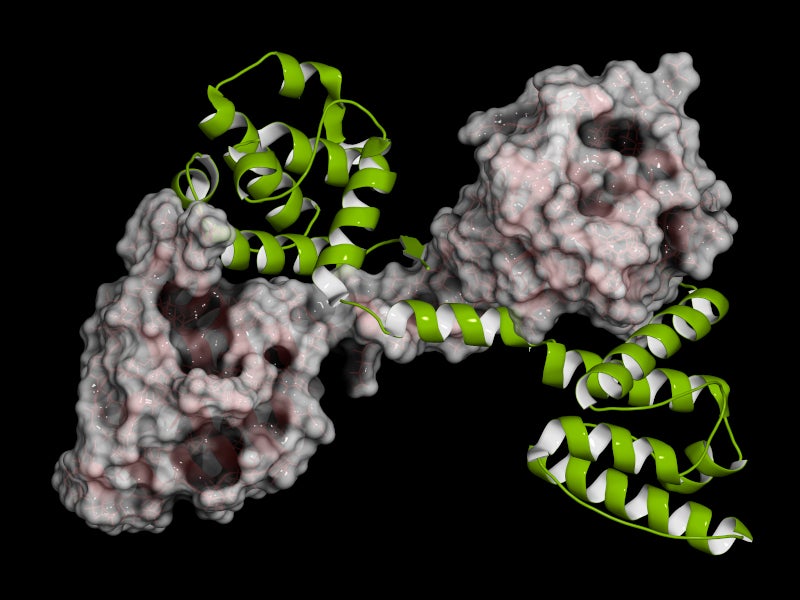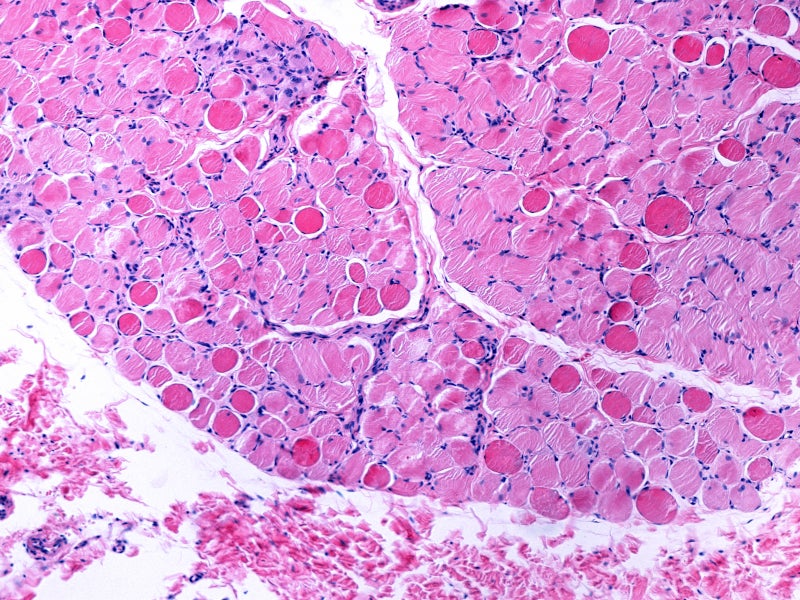ELEVIDYS (delandistrogene moxeparvovec) is a single-dose gene therapy for the treatment of ambulatory children aged four to five with Duchenne muscular dystrophy (DMD), a condition characterised by progressive muscle weakness.
The therapy is specifically for those confirmed to have a mutation in the dystrophin gene, which is crucial for muscle function. The therapy works by delivering a gene that codes for a shortened form of dystrophin, known as ELEVIDYS micro-dystrophin, to muscle cells.
ELEVIDYS is a suspension for intravenous infusion with a nominal concentration of 1.33×1013vg/ml, provided in a customised kit containing ten to 70 single-dose vials of 10ml volume.
ELEVIDYS development details
Sarepta Therapeutics, a biotechnology company based in the US, has developed ELEVIDYS in collaboration with Roche and is responsible for its global development, manufacture and distribution within the US. Roche is responsible for extending access to ELEVIDYS for patients outside the US.
Sarepta signed a commercial supply agreement with Catalent, a pharmaceutical company based in the US, in January 2023, enabling the latter to manufacture delandistrogene moxeparvovec. The agreement also outlines Catalent’s potential support for other gene therapy candidates in Sarepta’s limb-girdle muscular dystrophy (LGMD) pipeline.
Orsini Specialty Pharmacy, a speciality pharmacy based in the US, was selected by Sarepta Therapeutics as a limited distribution provider for ELEVIDYS in June 2023.
In August 2023, Quest Diagnostics, a diagnostic information services provider based in the US, received breakthrough device designation from the US Food and Drug Administration (FDA) for its AAVrh74 ELISA assay, intended to detect antibodies to AAVrh74 capsid in human serum. The assay aids in identifying patients eligible for ELEVIDYS treatment.
Regulatory approvals for ELEVIDYS
In June 2023, the FDA granted accelerated approval to ELEVIDYS for the treatment of DMD in children aged four to five years with a confirmed mutation in the DMD gene. The approval is contingent upon the verification of clinical benefit in confirmatory trials.
ELEVIDYS is contraindicated in patients with specific deletions in the DMD gene. The approval was based on the increase in ELEVIDYS micro-dystrophin protein expression in skeletal muscle observed in clinical studies and the safety data from SRP-9001-101, SRP-9001-102 and SRP-9001-103, as well as the results of two efficacy clinical trials SRP-9001-102 and SRP-9001-103.
In December 2023, Sarepta submitted an efficacy supplement to the biologics licence application for ELEVIDYS, seeking to expand its label to include DMD patients without restrictions on age or ambulatory status. The supplement is supported by results from the EMBARK and ENDEAVOR clinical studies and was submitted with a request for priority review.
Sarepta also fulfilled the EMBARK post-marketing requirement and submitted it to the FDA, requesting the conversion of the drug’s accelerated approval to traditional approval.
Duchenne muscular dystrophy: causes and symptoms
DMD is a rare, fatal, X-linked neuromuscular disease caused by mutations in the dystrophin gene. Symptoms typically begin in childhood and include muscle weakness, frequent falls, fatigue, learning difficulties and heart and respiratory issues.
Most individuals with DMD require full-time wheelchair use in their early teens and eventually lose their ability to do daily tasks, such as using restrooms, washing and eating, independently. The disease progresses to life-threatening heart and respiratory failure, often resulting in premature death in the 20s or 30s.
Current treatments for DMD focus on managing symptoms, with corticosteroids being the mainstay of drug therapy. Exon-skipping therapies, which use antisense oligonucleotides to restore small amounts of dystrophin, are also used but require repeated administration.
ELEVIDYS mechanism of action
ELEVIDYS is a recombinant gene transfer therapy that delivers a gene coding for ELEVIDYS micro-dystrophin, a shortened protein that mimics the function of dystrophin.
Administered as a single intravenous dose, the therapy uses an adeno-associated virus for targeted delivery of the gene to muscle tissue, leading to the production of ELEVIDYS micro-dystrophin.
ELEVIDYS also delivers a muscle-specific promoter, a DNA element that regulates the activity of a MHCK7 gene, aiming to enhance the gene’s activity in cardiac and skeletal muscles.
ELEVIDYS represents a significant advancement in the treatment of DMD, offering a new therapeutic option that addresses the underlying genetic defect.
It is a one-time gene therapy that has the potential to provide lasting benefits to children suffering from the debilitating condition.
Clinical trials on ELEVIDYS
ELEVIDYS has been under evaluation in clinical studies including SRP-9001-101, SRP-9001-102, and SRP-9001-103.
The FDA granted accelerated approval for ELEVIDYS, primarily based on data from studies SRP-9001-102 and SRP-9001-103. More than 80 patients treated across the two studies have contributed to the safety profile of ELEVIDYS.
The SRP-9001-101 clinical trial evaluated the safety, tolerability and proof of concept of a single dose of clinical process SRP-9001 (investigational name of ELEVIDYS) material in four ambulatory participants with DMD aged from four to seven.
Safety was the primary endpoint of the study, while the secondary endpoints included the change in micro-dystrophin expression before and after the treatment, reduction in creatine kinase, North Star Ambulatory Assessment (NSAA) total score, and timed function test. NSAA is a 17-item rating scale utilised to measure motor function in children with DMD.
Long-term results from Study SRP-9001-101, after four years, indicated that the treated participants maintained a positive mean 7.0-point difference in total NSAA scores compared to baseline.
Study SRP-9001-102 was a double-blind, randomised clinical trial comparing SRP-9001 to placebo in 41 participants with DMD aged from four to seven. The primary endpoints were micro-dystrophin expression at 12 weeks and change in NSAA total score at 48 weeks compared to the placebo.
Study SRP-9001-103, also known as ENDEAVOR, employed commercially representative SRP-9001 material at the target commercial dose. One-year functional results from the study’s Cohort 1, comprising 20 boys aged four to seven, showed a 3.8-point and 3.2-point improvement on the NSAA compared to a propensity-score weighted external control.
The primary endpoint was the change in micro-dystrophin protein expression, as measured by western blot at 12 weeks.
In addition to the NSAA improvements, participants in the study recorded statistically significant enhancements in timed function tests one year after treatment. Improvements in time to rise and the ten-metre walk test were noted when compared to the external control.
An integrated analysis of one-year functional data from 52 patients across studies 101, 102, and 103 showed that SRP-9001-treated patients improved by 3.1 points on the NSAA total scores from baseline, which was 2.4 points higher than the propensity-weighted external control group.
The most common adverse reactions observed in patients during the trials were vomiting, nausea, acute liver injury, increased liver function tests, pyrexia (fever) and thrombocytopenia (abnormally low platelet counts in the blood).
Additional clinical trials on ELEVIDYS
EMBARK (Study SRP-9001-301), a global, randomised, double-blind, placebo-controlled Phase III clinical trial, has recruited 126 participants with DMD aged four to seven. The company has committed to the completion of the confirmatory trial as part of the accelerated approval pathway.
The study results from EMBARK indicated a 2.6-point improvement in the NSAA total score 52 weeks after treatment with ELEVIDYS compared to the placebo group. Although the difference did not reach statistical significance, ELEVIDYS demonstrated a clinically meaningful treatment benefit across age groups. The study also reported consistent treatment benefits in other timed functional endpoints.
EMBARK’s primary endpoint is the change from baseline in NSAA total score at week 52 following the treatment. Secondary endpoint measures include the quantity of shortened dystrophin produced by ELEVIDYS, timed function tests, stride velocity and validated patient-reported outcome measures.
The most common treatment-related adverse events reported in patients during the trial were gastrointestinal events, such as vomiting, nausea, and decreased appetite, and pyrexia.
The clinical trials have demonstrated that ELEVIDYS has the potential to modify the trajectory of DMD and provide benefits to patients. The safety and efficacy data from these studies support the continued evaluation and potential label expansion of ELEVIDYS for the treatment of DMD.





